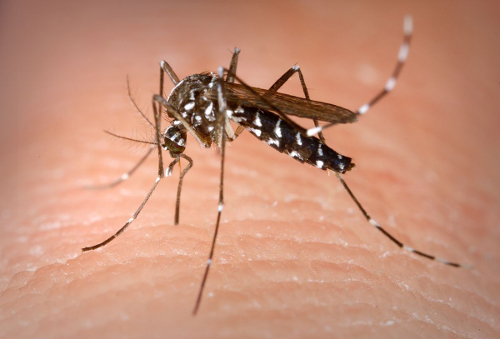2018 SRE Project
Mosquito Population Response to Environmental Variables
Participants:
Annastashia Blesi, Univ. of Tennessee
Hanna Reed, Univ. of Central Florida
Samantha Brozak, Arizona State Univ.
Mentors:
Dr. Rebecca Trout Fryxell, Medical and Veterinary Entomology, University of Tennessee
Dr. Suzanne Lenhart, NIMBioS Assoc. Director for Education & Outreach; Mathematics, Univ. of Tennessee
 Project Description. In East Tennessee, human acquired mosquito-borne viruses include La Crosse virus, which has bird and small mammal reservoirs. Knowing mosquitoes are dependent on their environment, mosquito populations can be predicted if environmental variables are understood and the reasons for vector and pathogen presence and absence can be described. Knowing how infected and uninfected mosquito populations respond to environmental variables will lead to better understanding of the ecological relationships, quantifying disease and nuisance impacts, and integrating management options. Using data on mosquitoes collected in Trout Fryxell's lab in 2017, with details on the life stages and virus load status, the student team will formulate an epidemiological model to predict mosquito abundance levels across their life stages, including the impact of environmental variables. Connecting with human La Crosse cases in this area, the project will seek to understand the role of Aedes mosquitoes in La Crosse virus transmission to children.
Project Description. In East Tennessee, human acquired mosquito-borne viruses include La Crosse virus, which has bird and small mammal reservoirs. Knowing mosquitoes are dependent on their environment, mosquito populations can be predicted if environmental variables are understood and the reasons for vector and pathogen presence and absence can be described. Knowing how infected and uninfected mosquito populations respond to environmental variables will lead to better understanding of the ecological relationships, quantifying disease and nuisance impacts, and integrating management options. Using data on mosquitoes collected in Trout Fryxell's lab in 2017, with details on the life stages and virus load status, the student team will formulate an epidemiological model to predict mosquito abundance levels across their life stages, including the impact of environmental variables. Connecting with human La Crosse cases in this area, the project will seek to understand the role of Aedes mosquitoes in La Crosse virus transmission to children.
NIMBioS
1122 Volunteer Blvd., Suite 106
University of Tennessee
Knoxville,
TN 37996-3410
PH: (865) 974-9334
FAX: (865) 974-9461
Contact NIMBioS


